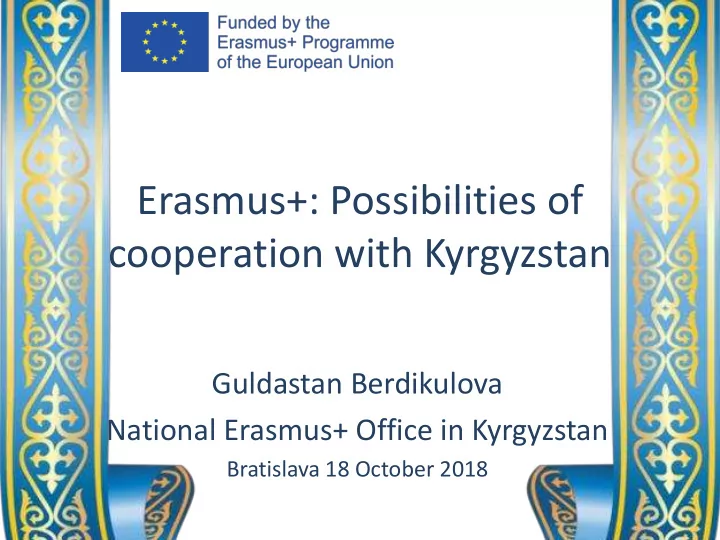

Erasmus+: Possibilities of cooperation with Kyrgyzstan Guldastan Berdikulova National Erasmus+ Office in Kyrgyzstan Bratislava 18 October 2018
Outline: Higher education agenda in Kyrgyzstan Tempus / Erasmus+ impact Higher education challenges in Kyrgyzstan National / Regional priorities for Central Asia CACTLE project Role of National Erasmus+ Office in Kyrgyzstan
COUNTRY DOCUMENTS Development through innovation, knowledge and the widespread use of information technology In 2017, new orientations were set for the country's development relating to its transition to digitalization and the creation of digital state, digital economy and digital society.
ICT in Education policies Sustainable E-learning development Third Action plan for 2018- 2020: cross cutting issues National Inclusive Qualification education System Gender equality
AGENDA OF HIGHER EDUCATION 1. Higher education in KR is offered by higher professional education institutions, which comprise universities, academies, institutes and colleges 2. Universities offer programs in 3 languages: Kyrgyz, Russian and English. 22 universities offer programs in English 3. Higher education structure Doctor of Sciences Candidate of sciences Master Degree(2 years) Bachelor Degree(4years) Secondary School (11 years)
Statistics Institutions Number of pupils 160 180000 161400 139 160000 140 140000 120 120000 93 100 90585 100000 80 80000 56 60 60000 40 32331 40000 20 20000 0 0 Professional Secondary HEI Professional Secondary HEI lyceums vocational lyceums vocational education education
Impact of Tempus / Erasmus + projects on higher education reforms at the national level Introduction of a two-level • Bachelor, Master – 2012 (three) degree in Higher • PhD programs – piloting since 2014 Education • Competence based approach Reform of the content of higher education • Expected learning outcomes • ECTS, office registers, academic counselling, Reform of the organization of career centres the educational process • Independent accreditation, Reform of the quality assurance system • accreditation agencies • ECTS, transcripts, diploma supplement, The development of academic mobility • Mobility support systems • National qualification Framework draft,methodology on Establishment and development of National Qualification Framework, the link sectoral qualification framework between HE and labor market research
Regional priorities for Central Asia and Kyrgyzstan National priorities Regional priorities for Central Asia Curriculum development: Curriculum development: Education; Business and administration; Education; Humanities (except languages); Languages; Social and behavioural science; Social and behavioural science; Business and Business and administration; Law; Information administration; Physical sciences; Information and Communication Technologies; and Communication Technologies; Engineering Manufacturing and processing; Agriculture, and engineering trades; Agriculture, forestry, forestry, fisheries and veterinary; Health; fisheries and veterinary; Health; Biological and Security services related sciences; Mathematics and statistics; Manufacturing and processing; Languages; Personal services; Architecture and construction; Transport services Improving quality of education and teaching: Improving quality of education and teaching: Governance, strategic planning and Governance, strategic planning and management of higher education institutions; management of higher education institutions; Internationalisation of higher education Internationalisation of higher education institutions; institutions; Development of research and Development of research and innovation innovation capacities; capacities; Quality assurance processes and mechanisms
National priorities for Kyrgyzstan: 2 National priorities Regional priorities for Central Asia Developing the higher education sector Developing the higher education sector within society at large: within society at large: Lifelong learning, continuing education; Lifelong learning, continuing education; Non-University sector at tertiary education Recognition of qualifications and level; Development of school and Qualification frameworks; vocational education at post-secondary non-tertiary education level; University- New technologies in higher education; enterprise cooperation; Definition, implementation and monitoring Recognition of qualifications and of reform policies; Qualification frameworks; Knowledge triangle, innovation; New technologies in higher education;
Challenges in 2018-2020 - E-learning - Improving higher education management and governance system - Qualification framework and professional standards - Network virtual interaction between higher education institutions - Development of mobility
Results of KA2-Call 1 Capacity building in HE ERASMUS+ CACTLE CBHE Project Coordinator : Vienna University of Economics and Business Spain: - Universitat Oberta de Catalunya Kyrgyzstan: - Universidade da Coruna – International University of Kyrgyzstan – Kyrgyz National University Kazakhstan: – Arabaev Kyrgyz State University - NARXOZ University Almaty - Karaganda Economic University - L.N. Gumilyov Eurasian National University Aims : This project is dedicated to implement a “Central Asian Centre for Germany: Teaching, Learning and Entrepreneurship – CACTLE” to promote Friedrich- Alexander Universität and strengthen the relations between Central Asian HEIs and enterprises as socio-economic actors to foster intrapreneurial and Erlangen- Nürnberg entrepreneurial competencies by Uzbekistan: • improving the teaching competencies of HEI-teachers - Westminster International • creating further training-opportunities for employees of university in Tashkent enterprises and institutions - Fergana State University • qualifying students in entrepreneurship and business development - Bukhara State University Duration of the project: 3 years http://www.cactle.eu/
National Erasmus+ Office in Kyrgyzstan: - Consulting support on priorities / innovation of ideas - Partner search - Communication with Kyrgyz higher education institutions and other wider stakeholders (ministries, state and private enterprises) - Structural projects – HERE involvement www.erasmusplus.kg Facebook.com/erasmuspluskg Instagram: erasmusplus.kg
Thank you!
Recommend
More recommend